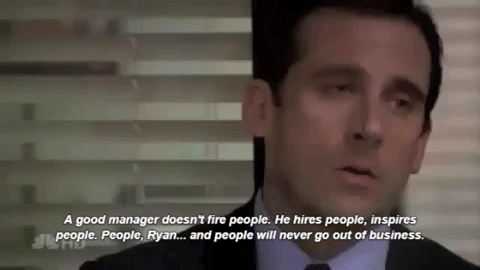The hit mockumentary sitcom “The Office” was the epitome of unabashed comedy and heartwarming moments that you may not always find in a real-life workplace setting. It gave viewers with some exceptionally hilarious scenes and many lovable and eccentric characters, but the one character that can stick out the most to the direct seller in you – is Michael Gary Scott. Michael Scott was the regional manager of Dunder Mifflin, a mid-level paper company in Scranton, PA. Played by Steve Carell, the iconic Michael Scott had an innate talent for making inappropriate jokes, not taking anything seriously and being completely unaware of his own shortcomings.
However, despite his cringe-worthy moments, lack of self-awareness, outrageous antics and myriad of questionable attitudes, Michael was excellent at his jobs and a skilled salesperson who knew his way around the business. He knew how to connect with people, close deals and run a successful paper company that often unknowingly brought about the highest earnings. However, at the same time, there are many times he falls short as person and a boss.
Although Michael Scott is far from being the conventional boss, his smart (or sometimes poor) choices throughout the show reflected a number of important lessons that direct sellers can apply in their journey to run a successful business. So, whether you’re a seasoned direct seller or just starting, there is always something to learn from the Michael Scott. So, let’s dive in and discover what he can teach us about direct selling and what makes him the World’s Best Boss.
1. Have Faith in Yourself, Even if Others Don’t

“I do my best work when people don’t believe in me.”
Michael Scott’s self-confidence is one of his most unmatched character traits. Despite his numerous flaws, he never doubted his own abilities as a salesman and a leader. He was always willing and enthusiastic to take risks and try new things, even when others doubted him, even if those decisions were against all logic and rationality. Whether it was starting a brand new paper company from scratch or becoming the leader of the number one Dunder Mifflin branch, Michael knew what he wanted to achieve and why it mattered, and this clarity of purpose gave him the strength to persevere even in the face of adversity.
Direct selling is a profession that requires you to have an immense faith in yourself. There are many instances wherein you can encounter setbacks and risks, but having the same kind of unwavering belief and confidence in yourself as Michael can help you overcome any obstacle in your path. This kind of self-belief, focus and clarity can help you to articulate your goals and motivations in order to build a successful business.
2. Value Every Member of Your Team

“The people you work with are, when you get down to it, your very best friends.”
From the receptionist to the warehouse workers, Michael cared about every single one of his employees. (Except toby – and we don’t blame him). Although he was notorious for invoking vexation from his employees, he was eventually respected and adored by them all by the time of his departure. Michael goes out of the way to ensure that all his employees, irrespective of their stature, are seen and heard. Michael takes a vested interest, almost to the point of intrusion, in the personal lives of his employees and made an effort to connect with them on a deeper level. His empathy and compassion was not limited to his employees, but also their beloved pets. (RIP, Sprinkles.) Michael is known for throwing all sorts of parties for his employees, organizing office outings, even going out of the way to show support to his employee’s endeavors.
By showing an interest and caring for his employee’s lives outside of work, Michael creates a sense of camaraderie and demonstrates that he values them as individuals, not just employees. He recognizes their strengths and contributions and tries to create a sense of unity and support among his employees.
Direct sellers can learn a lot from Michael’s approach to valuing every member of their team. Your success as a direct seller is also determined by the performance of your team and your role as a leader. By taking an interest in your team members’ lives outside of work, recognizing their strengths and contributions, and creating a positive work environment, you can build strong and loyal teams that are dedicated to success. You can inspire your employees to work hard and contribute to the team’s overall success.
3. Build Relationships with Your Customers

“Make friends first, make sales second, and make love third. In no particular order.”
It can be gathered by now that Michael Scott was indeed a people’s person. He had a certain savior faire and charm around his clients and prospects that made him a skilled salesperson. While this certainly benefitted his business, his motive wasn’t only limited to that. He genuinely enjoyed talking to people and cultivating relationships with his clients, and this virtue of Michael reflected in his successful client meetings throughout his tenure. His charisma and relationships that he fostered as a salesperson allowed him to poach several major clients from his toughest competitors for his hardly established brand new paper company. Michael makes an effort to get to know his customers on a personal level. He takes the time to learn their names, their interests, and their likes and dislikes. This helped him build trust and rapport with his clients.
This attribute of Michael Scott shows that cultivating relationships with your clients can be an impetus for unending business success. His approach to cultivating relationships with his customers was a combination of personalization, enthusiasm, going the extra mile, and vulnerability. Direct sellers can learn from his approach by building a genuine connection with their customers, showing enthusiasm for their products or services, going above and beyond, and being honest and transparent with them. By following these principles, direct sellers can build strong relationships with their customers and create a loyal customer base.
4. Don’t Make Promises You Can’t Keep

“I’ve made some empty promises in my life, but hands down, that was the most generous.”
Throughout the show, Michael in infamous for making bold claims and promises that are far from being realistic. He often promises his customers things that he cannot deliver. For example, in one episode, he promises a client that he can get them a discount on a product that he has no control over, or when he promised an underprivileged batch of high school students that he would pay for all of their college tuitions. Rest assured, these empty promises often backfired terribly. These promises are unrealistic, and ultimately, impossible for Michael to keep, causing him to backtrack which would lead to disappointment and frustration. While this can be entertaining in a show, it can be extremely damaging in a real life business.
As a direct seller, your reputation is an integral aspect of your business. Making such empty promises can lead to disappointed customers, damaged reputation, and lost business. Direct sellers can learn from Michael’s mistakes by avoiding the temptation to make unrealistic promises. Instead, they should focus on delivering high-quality products and excellent customer service. Direct sellers should be honest with their customers about what they can and cannot deliver, and they should always follow through on their commitments. One way to avoid making unrealistic promises is to under-promise and over-deliver. This means setting expectations that are achievable and then going above and beyond to exceed those expectations. Michael Scott’s tendency to make unrealistic promises serves as a cautionary tale for direct sellers. By avoiding temptation to make unrealistic promises and focusing on truth, transparency and delivering high quality, direct sellers can build trust and loyalty with their customers.
5. Embrace Technology

“When I discovered YouTube, I didn’t work for 5 days.”
“The Office” aired at the time where technology was still in development for what it is today. Nonetheless, there were still many innovations and new advancements that could change the course of any business and optimize many tasks. Although Dunder Mifflin has their reservations for adopting technology to streamline their work, Michael Scott’s willingness to venture into new territory allowed him to embrace technology and incorporate it into his work, albeit not in the most efficient way. However, he also pointed on the fact that technology and automation can never replace the skilled work of his intelligent team.
Michael used email and other digital communication tools to stay in touch with his colleagues and clients. He also attempted to use technology to improve his work processes and increase productivity. For example, he tried to use a software program to improve his time management skills and a Bluetooth headset to make phone calls on the go. Michael also recognized the importance of social media in promoting his business. He attempted to use platforms like Twitter and Facebook to advertise his products and connect with his customers. While Michael’s relationship with technology wasn’t the most lucrative, he still believed in advancing and adopting technology in his work.
Today, technology and the unfathomable power of AI has caused dramatic shifts in the working sector. And it is necessary for direct sellers to recognize the value of using technology to improve their work processes, communicate with customers, and build their brand. By embracing technology and staying up to date with the latest trends and tools, direct sellers can position themselves for success in an increasingly digital world.
Learning to Sell the Michael Scott Way

In conclusion, while Michael Scott may not be the first person that comes to mind when it comes to business acumen, there are plenty of direct selling lessons that can be learned from his actions (and antics) on “The Office.” From building relationships with customers to avoiding unrealistic promises, and embracing technology to streamline work processes, there are many valuable insights that direct sellers can glean from Michael’s experiences. So, in the words of Michael Scott himself, “Sometimes I’ll start a sentence, and I don’t even know where it’s going. I just hope I find it along the way.” Let’s hope that direct sellers can find their way to success by learning from the best (or maybe not the best) lessons of Michael Scott.

